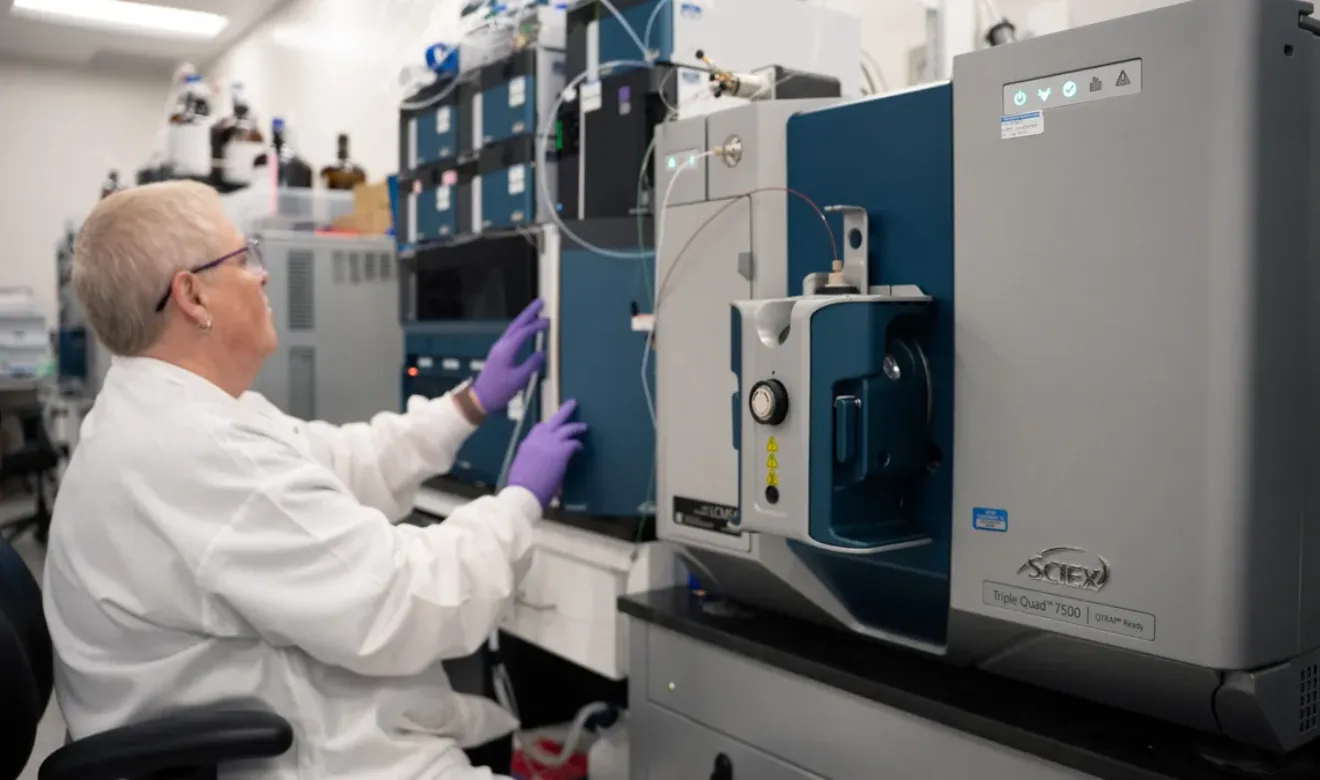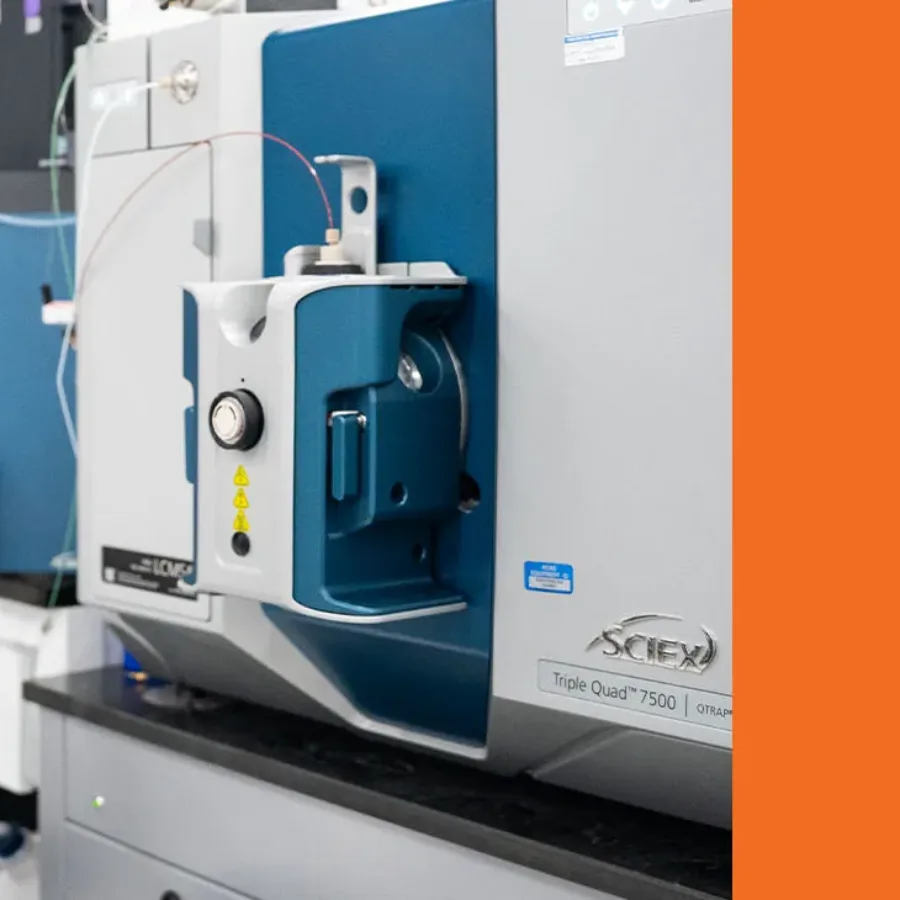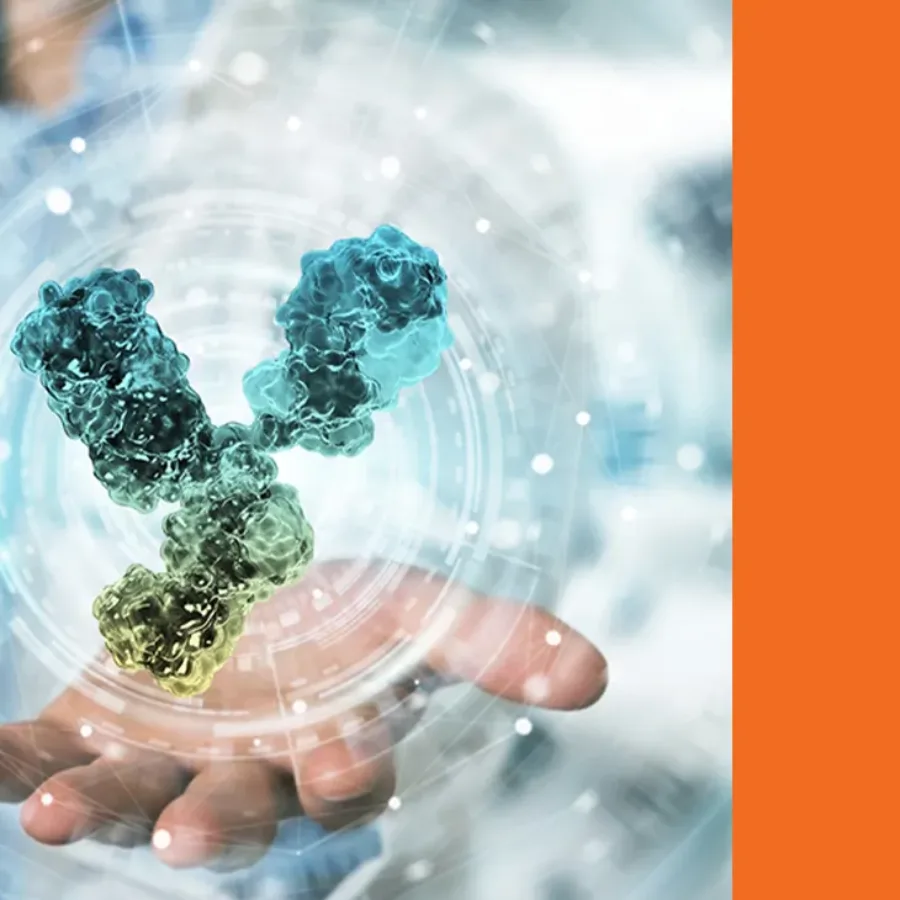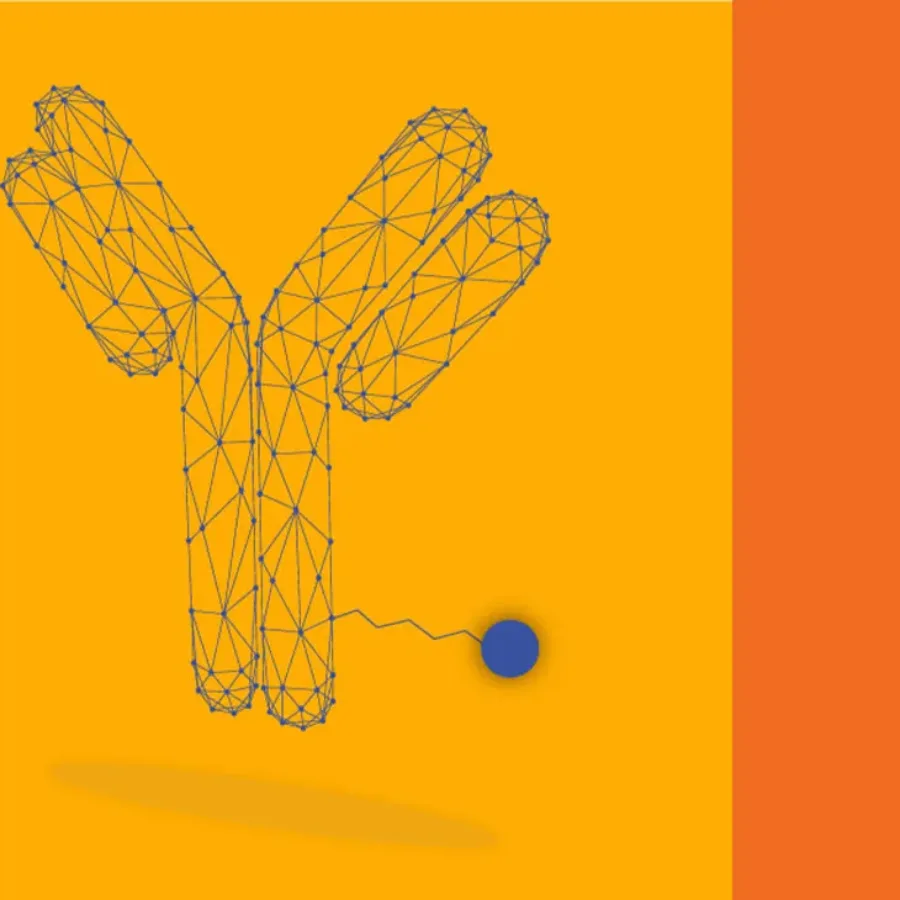
Large Molecule Bioanalysis by Hybrid LC-MS/MS
Hybrid LC-MS/MS at KCAS Bio delivers advanced, high-sensitivity bioanalytical services for complex and emerging large molecule therapeutics.

Large Molecule Bioanalysis
KCAS Bio is an industry-leading expert in Large Molecule Bioanalysis, providing precise quantification of proteins, antibodies, and other complex modalities in a wide range of fluids and tissues, from early discovery through clinical development.
Our scientists leverage both LBA and (Hybrid) LC–MS/MS platforms to deliver the right strategy for each program, supported by advanced flow cytometry and molecular technologies – all under one roof for maximum efficiency and insight.
Large Molecule Bioanalysis at KCAS Bio refers to the bioanalysis of any modality with a molecular weight of greater than 10K Daltons. Biologics we support include:
- • Monoclonal Antibodies | Bispecifics | Trispecifics | Antibody Fragments
- • Peptides & Small Proteins | Cytokines | Fusion Proteins Pegylated Proteins
- • Oligonucleotide therapeutics: ASOs | siRNA | RNA | DNA
- • Lipids | Glycosphingolipids | Eicosanoids | Steroids | LNPs
- • ADC (Linkers & Payloads) | AOC | ARC
- • mRNA or DNA Vaccines | Protein Subunit Vaccines | Viral Vector Vaccines | Inactivated or Attenuated Virus

Your bioanalytical partner for hybrid LC/MS-MS services
Deep Expertise Since 2018
Since 2018, our hybrid LC‑MS/MS platform has helped clients overcome complex bioanalytical hurdles. Backed by over 20 years of experience, our team designs studies that reduce risk and deliver reliable results.
Cutting-Edge Instrumentation
Your assays demand precision and speed. Our SCIEX 7500+ and HRMS Orbitrap systems offer exceptional sensitivity, dynamic range, and throughput to support challenging large molecule and biomarker analyses without compromising timelines.
Regulatory-Grade Quality
Our GLP/GCP-compliant workflows align with FDA, EMA, and ICH standards, integrating best practices to ensure your data meets regulatory expectations and your submissions proceed smoothly.
Single-Site Collaboration
Our LBA and MS teams work side-by-side in a single facility, enabling real-time collaboration, streamlined workflows, and faster problem-solving , keeping your program on track.
Proven Rescue Performance
Our hybrid LC‑MS/MS expertise rescues challenging studies, such as ADC payload quantitation, to deliver the accurate data you need to move forward.
What is hybrid LC-MS/MS?
Hybrid LC-MS/MS, also known as immunoaffinity LC-MS/MS, is a two-step analytical approach that combines affinity capture, typically using magnetic beads or column-based supports, with tandem mass spectrometry detection. Unlike conventional ligand-binding assays (LBAs), it requires only one reagent, enabling greater flexibility, especially when reagent availability is limited.
Key Benefits:
- Supports therapeutic proteins, biomarkers, and novel conjugates across preclinical and clinical development.
- Ideal for complex matrices and analytes requiring high specificity.
- Enables detection of post-translational modifications and structural variants.
- Multiplexing capabilities to simultaneously quantify multiple analytes or molecule regions.
Dawn Dufield, Ph.D. and Dominic Warrino, Ph.D. from the KCAS Bio, Kansas City location, share some exciting insights about our labs, and an intersting discussion about hybrid LC-MS/MS and its applications in drug development.
Your molecule, our expertise. Trust KCAS Bio’s expertise in hybrid LC-MS/MS.
Applications of Hybrid LC-MS/MS assays in drug development
Therapeutic Areas
Hybrid LC-MS/MS is used across all stages of the drug development process from discovery to preclinical and clinical analysis. It applies to various therapeutic areas including:
Oncology: Bi-specific antibodies and novel biologics | ADCs (antibody-drug conjugates) | Peptide therapeutics.
Immunology & Autoimmune Diseases: Monoclonal antibodies, fusion proteins, or biologics with challenging endogenous interferences | Cytokines and biomarkers with low circulating concentrations.
Infectious Diseases: Large molecule antivirals and therapeutic proteins.
Rare Diseases & Genetic Disorders: High-cost biologics | Enzyme replacement therapies and gene therapy products.
Modalities
Generic Monoclonal Antibody (mAb) Assays: These assays benefit from rapid hybrid LC-MS/MS method development using standardized conditions, enabling quick and cost-effective support for in vivo PK studies across various preclinical species.
Antibody-Drug Conjugates (ADCs): ADC analysis typtically require multiple assays, hybrid LC-MS/MS can quantify both ADC and total antibody in a single method, depending on conjugation and linker chemistry.
Protein Biomarkers: Challenges include lacking reference standards and differentiating total, free, or bound forms. Hybrid LC–MS/MS addresses these with adaptable preparation and quantification strategies.
Novel Drug Conjugates: Hybrid LC–MS/MS accommodates complex formats like Antibody Oligonucleotide Conjugates (AOCs), Antibody-RNA Conjugates (ARCs), and peptide-linked antibodies, supporting analysis of diverse molecular structures.
When is hybrid LC-MS/MS the best choice for large molecule bioanalysis?
Hybrid LC-MS/MS can benefit you and your project’s needs because it can represent the best or only choice in many scenarios.
Hybrid LC-MS/MS can be a game changer when traditional ligand binding assays have failed for a variety of reasons including interference, drug tolerance etc. Leveraging the need for only one reagent also offers many creative solutions not available to LBA.
Reagent Independence
When reagent availability is limited and LC-MS/MS assay development is still possible.
Minimal Reagent Need
When only one or no high-quality reagents are available for assay development.
Rapid Start
When fast method feasibility or development is required with short lead times.
High Selectivity
When high selectivity is needed to avoid interferences using extraction, chromatography, and MS/MS.
Species Flexibility
When rapid translation between species is needed despite sequence changes, with less concern for antibody binding.
Endogenous Differentiation
When differentiation between endogenous proteins (e.g. replacement therapies) and human drug is required in preclinical samples.
Sequence Resolution
When detection of small sequence changes, such as single amino acid substitutions or phosphorylations, is necessary.
Analytical Flexibility
When analytical flexibility is needed to select different surrogate peptides without being tied to a single molecular entity.
Multi-Target Analysis
When quantitation is needed for different parts of the same protein or for different proteins simultaneously.
Technology and instrumentation for hybdrid LC-MS/MS
We use the latest high-resolution LC-MS/MS systems - available in redundant configurations - for reliable, high-performance bioanalysis.
We have advanced technology to move your science forward. Speak with a KCAS Bio expert now.
Why work with KCAS Bio?
Full-Service Bioanalysis
End-to-end method development, validation, and reporting under one roof.
Regulatory Expertise
Deep familiarity with FDA, and EMA requirements.
Cutting-Edge Technology
Best-in-class triple quadrupole LC-MS/MS and high-resolution MS systems.
Flexible, Customized Workflows
Tailored workflows to meet unique project goals and timelines.
Broad Sample Type and Matrix Expertise
Plasma, serum, urine, CSF, and tissues plus unstable/rare matrices.
Global Presence with Harmonized Quality
Consistent technical standards and harmonized operations worldwide.
FAQs
Looking for expert insight? Here are some of the top hybrid LC-MS/MS-related questions our sponsors ask us.
What is the difference between LBA and Hybrid LC-MS/MS?
Hybrid LC-MS/MS uses only one capture reagent and leverages MS for detection, making it ideal for limited reagent availability or complex analytes.
When should I consider Hybrid LC-MS/MS?
Ideal when facing LBA interference, high sequence similarity between analytes, or lack of suitable reagents.
What are the sensitivity levels?
Often more sensitive than traditional LBAs, especially when using nano-flow LC and high-end mass spectrometers.
Can you support multiplexed assays?
Yes, hybrid LC-MS/MS easily supports multiplexing of multiple peptides or protein regions.
Do you help determine whether LC-MS/MS or LBA is best for my project?
Absolutely. We perform side-by-side feasibility testing to ensure the most efficient and reliable method is selected.
Additional resources
 Blogs
Blogs
Hybrid LC-MS/MS is a technique that combines an affinity capture step with LC-MS/MS detection. It typically requires only one antibody, in contrast to conventional ligand-binding assays (LBAs), which usually need two. This approach leverages the combined selectivity of affinity extraction and the analytical power of tandem mass…
 Blogs
Blogs
The age of therapeutic conjugation is upon us! Bioanalysis for support of next-generation Antibody Drug Conjugates (ADCs) and Antibody siRNA Conjugates (ARCs) have exploded recently due to the efficacy and safety that these therapies offer for immuno-oncology, rare diseases, vaccines, and potentially many other diseases. Recently, we have seen the…
 Blogs
Blogs
ADCs represent a promising class of targeted therapies, and understanding the intricacies of their analysis is crucial for their successful development. In this blog, we address common questions to guide you through the various considerations involved in ADC research and testing. We will cover key topics related to the…

Tell us how we can help with your project
We've earned our reputation for delivering reliable, error-free data. We understand the importance of speed, flexibility, and consistency and only make promises we can keep.